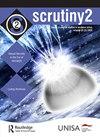Thinking with Crocodiles, Thinking Through Humans: Vulnerable, Entangled Selves in Lauren Beukes's Zoo City
IF 0.1
0 LITERATURE
Scrutiny2-Issues in English Studies in Southern Africa
Pub Date : 2018-01-02
DOI:10.1080/18125441.2017.1408676
引用次数: 7
Abstract
ABSTRACT Zoo City's (2010) author, Lauren Beukes, claims to have written her novel in response to widespread xenophobic attitudes towards refugees in South Africa. The frequent attacks made by crocodiles on these people as they attempt to enter the country by crossing the Limpopo River are a fitting, if gruesome, metaphor for such prejudice. Against this background, I read Zoo City's own crocodile as a central figure in Beukes's engagement with discourses of prejudice. The animal familiar of a murderous human, this crocodile is blatantly politicised. Anthropomorphising nonhuman animals, as Beukes does here, is generally criticised for perpetuating anthropocentric ways of looking at the world. However, I read Zoo City's crocodile in light of work carried out by scholars such as Neel Ahuja, Nandini Thiyagarajan, and Kari Weil, who suggest that this contested practice might yet be of value to wider efforts to combat prejudiced and hierarchical ways of thinking about others. Straddling the boundaries between human and nonhuman, predator and prey, Beukes's crocodile dramatises the extent to which humans and nonhumans are entangled with and connected to one another, not only through prejudiced language and imagery, but also through their shared vulnerability. Acknowledging such shared vulnerability is, I suggest, a good way for humans to begin to rethink themselves and their place in the world. Through her nonhuman animals, and in particular her crocodile, Beukes explores, then, the potential for human prejudice that has infiltrated the rest of the animal kingdom to be reappropriated as a tool for ethical progress. Indeed, if nonhumans are already present in the biopolitical fold on account of the human prejudice they bear, then they might just be able to help challenge, from the inside, the very human hierarchies of being on which prejudice is founded. This, I argue, is precisely the work performed by the complex figure of the crocodile in Beukes's Zoo City.思考鳄鱼,思考人类:劳伦·贝克斯动物园城中脆弱、纠缠的塞尔维斯
动物园城(2010)的作者Lauren Beukes声称,她的小说是为了回应南非对难民普遍存在的仇外态度。当这些人试图穿越林波波河进入该国时,鳄鱼经常袭击他们,这是这种偏见的一个恰当的比喻,尽管很可怕。在这种背景下,我读到了动物园城自己的鳄鱼,它是贝克斯参与偏见话语的中心人物。这种鳄鱼是一种熟悉的杀人动物,它被公然政治化了。像Beukes在这里所做的那样,使非人类动物拟人化,通常被批评为延续了以人类为中心的看待世界的方式。然而,根据尼尔·阿胡贾、南迪尼·蒂亚加拉詹和卡里·威尔等学者的研究,我阅读了动物园城的鳄鱼,他们认为这种有争议的做法可能对打击对他人的偏见和等级观念的更广泛努力有价值。Beukes的鳄鱼跨越了人类和非人类、捕食者和猎物之间的界限,不仅通过偏见的语言和图像,还通过他们共同的脆弱性,戏剧性地展示了人类和非人相互纠缠和联系的程度。我认为,承认这种共同的脆弱性是人类开始重新思考自己和自己在世界上的地位的好方法。通过她的非人类动物,尤其是她的鳄鱼,Beukes探索了渗透到动物王国其他部分的人类偏见被重新用作道德进步工具的可能性。事实上,如果非人类已经因为他们所承受的人类偏见而出现在生物政治圈中,那么他们可能会从内部帮助挑战偏见所建立的人类等级制度。我认为,这正是贝克斯动物园城复杂的鳄鱼形象所完成的工作。
本文章由计算机程序翻译,如有差异,请以英文原文为准。
求助全文
约1分钟内获得全文
求助全文
来源期刊
CiteScore
0.50
自引率
0.00%
发文量
10
期刊介绍:
scrutiny2 is a double blind peer-reviewed journal that publishes original manuscripts on theoretical and practical concerns in English literary studies in southern Africa, particularly tertiary education. Uniquely southern African approaches to southern African concerns are sought, although manuscripts of a more general nature will be considered. The journal is aimed at an audience of specialists in English literary studies. While the dominant form of manuscripts published will be the scholarly article, the journal will also publish poetry, as well as other forms of writing such as the essay, review essay, conference report and polemical position piece. This journal is accredited with the South African Department of Higher Education and Training.

 求助内容:
求助内容: 应助结果提醒方式:
应助结果提醒方式:


